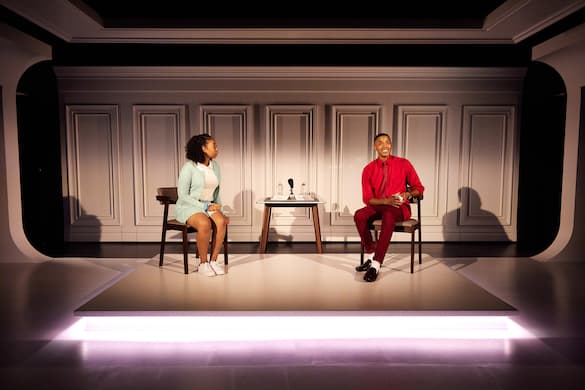Take Time To Ponder Shades of Meaning as You Take In ‘Patience’
There’s plenty to unravel in playwright Johnny G. Lloyd’s thoughtful, clever, and deceptively agreeable one-act piece.

When Daniel, the 25-year-old protagonist in Johnny G. Lloyd’s “Patience,” introduces himself as “the current reigning world solitaire champion,” he isn’t using a metaphor to describe his sense of isolation. The playwright, however, may be doing just that.
In fact, it’s no coincidence that Mr. Lloyd has assigned this particular card game — which was originally and is sometimes still called “patience,” if you didn’t know — a central part in his thoughtful, clever, and deceptively agreeable one-act piece.
Daniel, played by the lankily handsome Justiin Davis, is hardly a loner in the traditional sense. As an international record holder, he holds court before crowds on a regular basis; he’s also engaged to be married, to Jordan, a gregarious young man keenly aware of the drama-queen proclivities — made endearing in Jonathan Burke’s finely tuned performance — that complement his beau’s more reserved demeanor.
We meet the couple as they are painting a room. Jordan asks Daniel to choose — another symbolism alert — between shades of gray. (Later, while the men are questioning their relationship, a pipe will burst.) Color plays a key role in this production; Jordan, despite his brighter, bolder personality, is dressed by costume designer Avery Reed — always impeccably — in subdued tones of beige and gray, while Daniel, the star, is conspicuous in spite of himself in burgundy, red, and salmon.
Race, specifically, also figures into “Patience,” which is nimbly directed by Zhailon Levingston, who helmed the more raucous “Chicken & Biscuits” on Broadway last year. All the characters are black, and Daniel recalls in the second scene, while addressing a group of students, how his parents “found it very important to nurture black talent because of, America, uh.” He pauses slightly. “America kinda being this.” Another pause. “It’s like a safety net, so.”
The point isn’t just that Daniel can be a wary or awkward public speaker; that’s part of it, though he’s also quite adroit and charismatic at times in Mr. Davis’s portrayal. Yet the character’s reluctance to make choices, or take risks, clearly extends beyond selecting paint. There’s a sense that celebrity is something that’s been thrust upon him — with the avid encouragement of his mother, who now manages him — and that, however fundamentally decent a person, he’s learned to view progress more through a personal lens than a larger, societal one.
Three female characters prove more aggressively aspirational, albeit in very different ways. Daniel’s stage mom, played by a witty Mary E. Hodges, pushes her son relentlessly before deciding that it’s time for her own “next chapter” — a term that others have used only in pondering Daniel’s future.
Then there’s Daniel’s friend and former competitor, Nikita, a teacher who juggles several jobs but is nonetheless identified in the stage directions (and represented by a graceful Nemuna Ceesay) as the one character who is “settled” — compared to Daniel, for instance, who’s still “learning,” or Jordan, who’s “trying.” The 18-year-old Ella, who’s “progressing,” is the hyper-ambitious, tightly wound solitaire prodigy Daniel is set to compete against, at his mother’s insistence, before retiring.
As played by Zainab Barry, Ella manages to seem at once irritating and pitiable while transcending both qualities. It is through this very young black woman that Mr. Lloyd most vividly suggests both enduring obstacles and the promise posed by superior aptitude and grit. In a climactic scene, Ella follows a revealing monologue by Daniel with one of her own, expanding on his references to Serena and Venus Williams — Daniel has been compared to the latter — in defending her consuming drive.
Surprisingly, given Daniel’s early reference to his parents’ mission, Mr. Lloyd does little on the surface to examine the specific relevance of race — or sexual orientation, for that matter — in his accomplishments and struggles, or in Ella’s. Conversely, much is made of similarities between the competitors, who even share a surname; Ella also forms connections with Daniel’s mother and Nikita that can seem contrived.
This strange match of subtlety and overstatement does serve a purpose: Ella’s sense of alienation is actually more profound than Daniel’s, and when she declares, during her final speech, “I will make room and I will still win/Because I know there can be more than one,” she addresses — and shoots down — enduring assumptions about the limits of Black achievement that have likely affected them both.
It may not be the most pointed assault on racism you’ll hear this season, but it packs a wallop, marking one of numerous moments in which “Patience” pays off.

